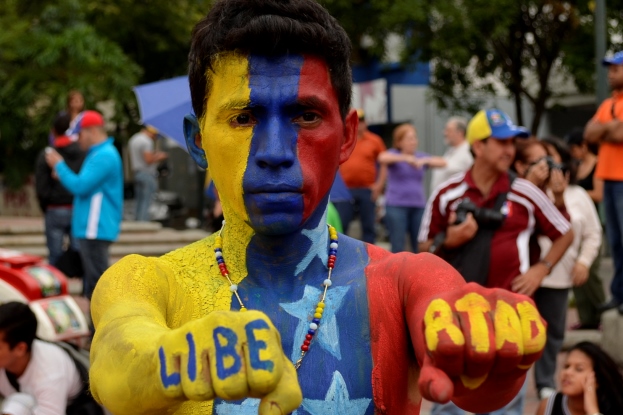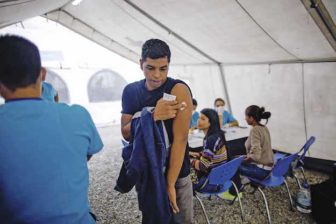Lorena remembers her first impression of Hugo Chávez. He was the man in the poster that her father brought from the polling station after casting his vote.
“He explained to me that he was the president and he was facing a re-election,” Lorena recalls. She was around six years old. “He told me the president is the one in charge of taking care of the citizens.”
She’s a college student now, part of what Hugo Chávez called la Generación de oro, or the Golden Generation: the Venezuelan youth born after he rose to power in 1998. They were raised in a country overflowing with petrodollars and with the promises of the Bolivarian Revolution; Chavismo shaped their political awareness, national identity and even their worldview.
Now they make up almost a third of the population – about 28 percent, according to 2011 census data – and reach adulthood as their country faces its most dire crisis in living memory. There were 21,752 homicides in 2016, according to Venezuela’s Attorney General. Inflation reached 550 percent, and the economy shrank 18 percent. All forecasts indicate 2017 will be worse.
Many of Chavez’s Golden Generation are now on the streets, fighting against the only government system they have ever known. As the government escalates the violence against protesters, they are among its victims. In nearly 50 days of anti-government marches, about 43 protesters have been killed, according to the Public Ministry. About half of them were under 20 years old.
Armando Cañizales is among the fallen. He was 17 years old, a musician who wanted to study medicine. He died after getting hit by a ball bearing while protesting in Caracas. The tragic incident has become iconic, causing indignation among loyalists and the opposition, but his case is hardly unique.
Lorena, despite being against the violence they may degenerate into, considers that protesting is a duty.
“At first I was scared,” she told AQ. “But once I got there and was surrounded by so many people who also seek a better country I felt so at ease that it’s beyond words. I may not know them, but they are like family and we are all there, looking for a common good.”
Life under Chavismo has been one of deprivation for young people like Lorena. They lack food, freedom of expression, the hope of a job – but they also lack small, simple joys that come with being young, they said.
“They stole our youth,” she said. “I listen my parents saying how they would go out at night to clubs, my father saying how he and his brother would go out ’til early morning and then sleep off in a public square until sunrise. Not now. We can only go out to a friend’s house.”
Ángela, a classmate and friend who is the same age as Lorena has a different story. Her parents were skeptical of Chavismo from the start.
“My mother always tells me that when Chávez got elected president everybody was celebrating and lighting fireworks,” she said, “but she, who was pregnant and expecting me, cried.”
Both Ángela and Lorena sense that, with unemployment at about 20 percent, according to IMF estimates, Venezuela offers no opportunities. Ángela hopes to continue her studies in Argentina. For Lorena as well, the future is uncertain but the direction is clear: she wants to go abroad.
“We’re halfway through our college career and we already have to think to which country we’re going to emigrate,” she said. “You won’t find any opportunities here.”
For Ricardo, the political and economic crisis made decisions difficult – he debated for a while whether to try to study abroad or start his college education in the country. Finally, he enrolled at the Central University of Venezuela, in Caracas. He’s the same age as Cañizales, who was also meant to study at UCV. He has a more critical view of the protests.
“The problem is that many are based on insults instead of arguments, on disorder instead of peace,” adding that “I worry about the resolution.”
This frustration with the lack of goals by the opposition is shared by Lorena and Ángela.
“I think the opposition is doing what it did years ago,” Ángela said. “We have made no progress and they have no plan.”
Ángela has not been involved in the protests, but despite her hesitation she supports them.
“I’m afraid go out to the street and still see nothing be resolved,” she said, pointing out it is a great risk, with no guarantees. “What happens with all those people who died?”
College students in Venezuela have a long record of being harbingers of political change. No doubt the most iconic is the “Generation of 1928,” which organized against the dictatorship of Juan Vicente Gómez (1908-1935). From this generation came writers, journalists and politicians, but not before facing long years of persecution, torture and exile. Many died in the conflict.
In a curious reversal, once the leaders of the Generation of 1928 took power they had decade-long clashes with student movements of later generations. Many members of these mostly left-leaning groups are part of the Venezuelan government today.
It’s tempting but unfair to compare some of the most critical moments of the 40 years of democratic bipartisanship that Chávez ended to the current crisis. But the comparison raises the question: will the Golden Generation break the cycle once they fully take over the reins of the country?
For now, they do what they can: protest, make themselves heard, demand change, and plan their futures, despite how difficult is to imagine a post-Chavista Venezuela. They distrust the opposition leadership but feel obligated to go on.
“It’s up to us to rebuild the country,” Lorena affirms.
The students interviewed for this article asked that their last names not be used for fear of reprisal.
—
González Vargas is a university professor in Maracay, Venezuela






